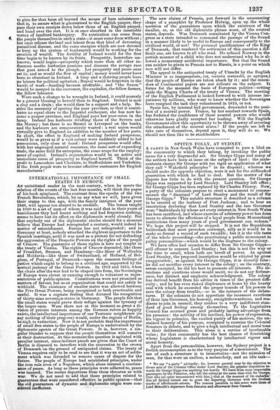INTERNATIONAL IMPORTANCE OF SMALL STATES IN EUROPE.
AN uninitiated reader in the next century, when he meets the relation of the events of the last four months, will think the pages of his book misplaced. The contrast from the epochs of the two French Revolutions, which, let us say what we will, have given their stamp to this age, with the family intrigues of the year
1846, will appear too absurd to be credible. The lesson taught in 1830 to a set of men of whom it was said that in their years of banishment they had learnt nothing and had forgotten nothing, seems to have lost its effect on the diplomatic world already. But that anybody out of the diplomatic circles should for a moment believe that Europe had retrograded a century, would indeed be matter of astonishment. Europe has not retrograded ; and in Germany at least, nobody attached the slightest importance to the Spanish marriage, until it was used as a pretext for not defending the aggression of the Despotic Powers on the rights of the people of Cracow. The guarantee of those rights is here not sought in the treaty of Vienna. The rights of Cracow depended, like those of Frankfort, Bremen, and Hamburg—like those of Wallachia and Moldavia—like those of Switzerland, of Holland, of Bel- gium, of Portugal, of Denmark—upon the common feelings of Justice which ought to belong to a civilized age, supported by the mutual jealousy of the Great Powers. In 1813 and 1815, when the chaos after the war had to be shaped into form, the Sovereigns of Europe were clever or cunning enough to volunteer as repre- sentatives of public opinion. Constitutions were not promised as matters of favour, but as an organization that could not safely be withheld. The existence of smaller states was allowed between the Five Great Powers, being recognized as both practicable and useful. It was a cognate feeling that dictated the recognition of thirty-nine sovereign states in Germany. The people felt that the small states would' prove their refuge against the tyranny of the larger ones. Were there not at this moment so great a di- vision of private interests among the German rulers as happily exists, the intellectual importance of our Teutonic neighbours (to say nothing of their progress) would, under the regime of Berlin, be nigh to extinction. Now it is not probable that the importance of small free states to the people of Europe is undervalued by the diplomatic agents of the Great Powers. It 111, however, a sin- gular blunder to suppose that the people themselves will connive at their destruction. At this moment the question is agitated with peculiar interest, since indirect proofs are given that the Court of Berlin is disposed to interfere with the succession to the crown of Denmark on the ground of antiquated claims. The treaty of Vienna requires only to be read to see that it was an act of settle- ment which was intended to remove cause of dispute for the future. The people of Europe had established principles, under the iron rule even of a Napoleon, which alone insured a continu- ance of peace. As long as these principles were adhered to, peace was insured. The recent departures from them threaten us with war. We do not need to add that these principles related to guarantees that were considered effective in public opinion—that the old guarantees of dynastic and diplomatic origin were con- sidered inefficient.
The new claims of Prussia, put forward in the unassuming shape of a pamphlet by Professor Helwig, open up the whole question of the guarantees upon which the existence of the smaller, or, as the old diplomatic phrase went, of the neutral states, depends. Was Denmark constituted by the Vienna Con- gress as a state intended to command the passage of the Sound in a manner likely to be useful to Europe and consequently to the civilized world, or not? The personal qualifications of the King of Denmark, that rendered the settlement of this question a dif- ficult one, are known to all who read. He refused Norway in the pettish manner of a child who does not understand why he is al- lowed a momentary accidental importance. But that the Sound can neither be given to Prussia nor to Russia, is a point on which tnen will not differ.
The appeal to the antiquated treaty of Utrecht by the English Minister is so inappropriate, (or, mutatis mutandis, so apropos,) that the people of Europe are taken aback by it ; and the inuen- does of Continental papers are not delicate on the subject. It forms for the moment the basis of European politics—setting aside the Magna Charts of the treaty of Vienna. The meeting of the English Parliament is looked forward to with intense im- patience by millions, who want to know whether the Sovereigns have resigned the task they volunteered in 1813, or not.
Spain has, by internal bad government, descended to the posi- tion of a neutral power. France, by her conduct towards Spain, has forfeited the confidence of those neutral powers who would otherwise have gladly accepted her leading. Will the English Government allow this opportunity to be thrown away of securing the attachment of the neutral states ? If the people are left to take care of themselves, depend upon it, they will do so. We should not then like to be stockholders.






























 Previous page
Previous page